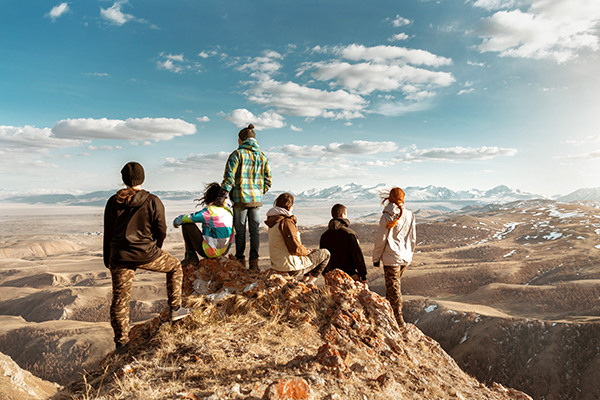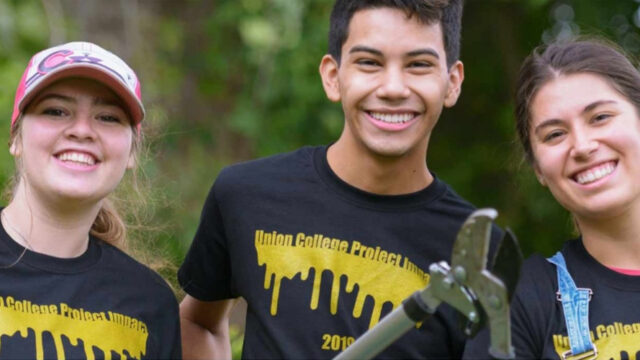How we find what we look for

On a cloudy afternoon in South Korea I watched water flow uphill. Cars, placed into neutral, also seemed to roll up the tarmac. I knew it was an optical illusion, yet I was still charmed.
I was traveling with strangers. We had few words in common—just smiles and gestures, yes and no. We had met on Halla Mountain, and as so often happens on mountains, we began hiking together. They shared tangerines; I shared chocolate. At the top the wind was brisk, and ravens wheeled above us like kites.
As we climbed down, the hikers made a group announcement. We’ll drive you back. They supplied a few English words, lots of gestures. I supplied a few Korean ones, indicating it was a long drive. Finally, I nodded.
It was during this trip that we stopped, and I watched as gravity seemed to disappear. What I would later remember is a feeling. It was one of camaraderie and warmth and gratitude. I could not repay these strangers, and they did not want me to.
Several years later I was in Japan with only enough money for lunch and bus tickets. I was there on a “visa run,” as we expatriates called it. I had arrived on a night ferry from South Korea and planned to return that evening. My timing, though, was terrible. It was a Japanese holiday, and the South Korean embassy was closed.
A sympathetic employee told me to come back the next morning. When I explained my predicament, begging her to stamp my passport anyway, she asked me to wait a few minutes. She returned with a 5,000 yen note ($50 then). “For a hotel,” she told me, pressing the money into my hand.
I have often been the recipient of kindnesses. I have been fed at Buddhist temples. I have had lost items returned. And once, at the top of a mountain, I was given a can of peaches and a pair of chopsticks. The gift was from the proprietor of the inn. It was night and I was exhausted from hours of hiking, the last few in the rain. When I tried to pay, the gentleman waved the money away. I must have looked a sight! Those peaches, they were delicious: cool and sweet and memorable.
Whenever I encounter graciousness, I want to cup the moment between my palms and hold it out—this really happened. And when I hear stories of extraordinary kindness, I feel happy. There is so much goodness, so much generosity. The world, I think in these moments, is a beautiful place. Yet, alongside this altruism, there is great cruelty.
The Other Story
The paradox was particularly vivid when Christ was born. Mary and Joseph were travelers dislodged from their home. In crowded Bethlehem an innkeeper made space for the couple in his stable.
After Jesus was born, shepherds came and worshipped the Baby. One can imagine the camaraderie that marked the occasion. Later, the small family was visited by Magi. These men risked their lives to worship Jesus and to give His parents a valuable message: flee!
In Matthew the nativity story ends with heartbreaking brutality. A calculating King Herod had all the boys in Bethlehem 2 years old and younger killed.
The story of Jesus’ birth began with such beauty. Far from home, Mary and Joseph were warmed by the kindness of strangers. God had come to earth. Angels sang. And later we sing “Joy to the World” and “Silent Night.” But such a miraculous occasion did not escape violence. Imagine Bethlehem’s grief!
Sometimes the world is beautiful. Sometimes people are compassionate. And sometimes cruelty overwhelms everything else. What good is a ride home when you compare it to war? What good is a can of peaches when you place it alongside genocide? Sometimes human kindness seems to be an optical illusion.
Christmas, with its gift-giving, has become a celebration of humanity’s altruism—and there is much to celebrate. For Christians, the season also points to God’s generosity. In the Gospels we find hope. Moreover, we find another way of viewing the world: Blessed are the meek. Blessed are the peacemakers. Blessed are the merciful. Blessed (even) are those who mourn, for they will be comforted (see Matt. 5:3-10).








